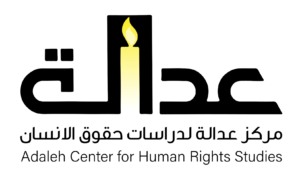
The Training and Capacity-Building Unit at the Adaleh Center for Human Rights Studies is a specialized unit focused on training, awareness, and education in the field of human rights. It aims to promote a culture of human rights across all segments of Jordanian society by providing knowledge, skills, guidance, and developing attitudes that balance rights and responsibilities while advocating for their protection.
The Unit aims to promote a culture of human rights across all segments of Jordanian society by providing knowledge, skills, and guidance, and by fostering attitudes that balance rights and responsibilities while advocating for their protection. This is achieved through the use of scientific methodologies and approaches to human rights education in both formal and non-formal settings.
The Training and Capacity-Building Unit aims to achieve the following objectives:
The Training Unit implements a range of measures to achieve its objectives, including:
Integrating women’s rights and Resolution 1325 enhances the Unit’s effectiveness, contributing to the Center’s goals of promoting equality and security. Key measures include:
Integrate gender perspectives in all training programs to understand differential impacts on men and women and to promote gender equality.
Offer dedicated programs to enhance understanding of women’s rights and address challenges they face.
Promote women’s involvement in all program aspects and encourage them to take leadership roles.
Partner with relevant organizations to advance women’s rights and combat sexual violence.
Assess program impacts on women and men separately to ensure social justice.
Organize workshops and events to highlight the importance of Resolution 1325 and its integration into programs.
Include measures that encourage women’s involvement in peace and security efforts.
Provide targeted training on gender-specific challenges in various contexts.
Promote understanding that women’s rights are essential for achieving security and stability.
Develop evaluation tools to measure programs’ effects on women’s rights and participation.
E-Learning Technology Program
Data Analysis Program
Private Sector Partnership Program
Community Engagement Program

The Adaleh Center for Human Rights Studies was established in 2003 by Jordanian human rights activists as a non-governmental, non-profit organization that operates with political neutrality and seeks to promote human rights values in Jordan and the Arab world.
Email : info@adaleh-center.org
Phone Number (06) 560 2371
Address:
Tla’a Alali-Almawrdy street -building no.4-first floor , Amman, Jordan
All rights reserved ⓒ Justice Center for Human Rights Studies || Designed and Developed by Portal Company